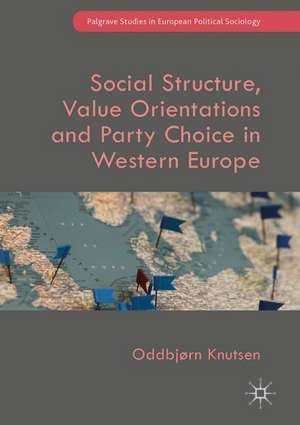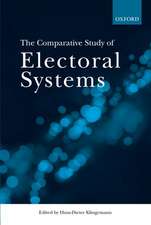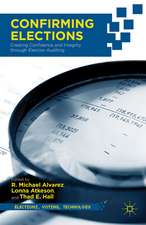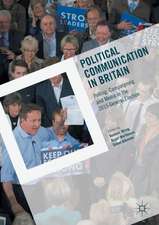Social Structure, Value Orientations and Party Choice in Western Europe: Palgrave Studies in European Political Sociology
Autor Oddbjørn Knutsenen Limba Engleză Hardback – 3 aug 2017
| Toate formatele și edițiile | Preț | Express |
|---|---|---|
| Paperback (1) | 631.00 lei 38-45 zile | |
| Springer International Publishing – 3 aug 2018 | 631.00 lei 38-45 zile | |
| Hardback (1) | 700.94 lei 6-8 săpt. | |
| Springer International Publishing – 3 aug 2017 | 700.94 lei 6-8 săpt. |
Din seria Palgrave Studies in European Political Sociology
-
 Preț: 399.62 lei
Preț: 399.62 lei - 15%
 Preț: 643.48 lei
Preț: 643.48 lei - 18%
 Preț: 1005.43 lei
Preț: 1005.43 lei -
 Preț: 392.75 lei
Preț: 392.75 lei - 15%
 Preț: 583.13 lei
Preț: 583.13 lei - 15%
 Preț: 696.96 lei
Preț: 696.96 lei - 15%
 Preț: 503.52 lei
Preț: 503.52 lei -
 Preț: 385.47 lei
Preț: 385.47 lei - 18%
 Preț: 784.48 lei
Preț: 784.48 lei - 18%
 Preț: 1003.38 lei
Preț: 1003.38 lei -
 Preț: 419.85 lei
Preț: 419.85 lei - 18%
 Preț: 738.52 lei
Preț: 738.52 lei -
 Preț: 381.21 lei
Preț: 381.21 lei - 18%
 Preț: 953.97 lei
Preț: 953.97 lei - 18%
 Preț: 725.39 lei
Preț: 725.39 lei - 15%
 Preț: 646.94 lei
Preț: 646.94 lei - 15%
 Preț: 584.92 lei
Preț: 584.92 lei -
 Preț: 227.81 lei
Preț: 227.81 lei - 15%
 Preț: 585.40 lei
Preț: 585.40 lei - 15%
 Preț: 469.22 lei
Preț: 469.22 lei - 15%
 Preț: 586.23 lei
Preț: 586.23 lei - 18%
 Preț: 781.94 lei
Preț: 781.94 lei - 15%
 Preț: 525.85 lei
Preț: 525.85 lei - 15%
 Preț: 696.35 lei
Preț: 696.35 lei - 15%
 Preț: 698.62 lei
Preț: 698.62 lei - 15%
 Preț: 698.15 lei
Preț: 698.15 lei - 18%
 Preț: 791.40 lei
Preț: 791.40 lei - 15%
 Preț: 472.51 lei
Preț: 472.51 lei -
 Preț: 384.31 lei
Preț: 384.31 lei -
 Preț: 389.70 lei
Preț: 389.70 lei - 15%
 Preț: 695.48 lei
Preț: 695.48 lei -
 Preț: 426.34 lei
Preț: 426.34 lei - 15%
 Preț: 704.87 lei
Preț: 704.87 lei -
 Preț: 390.84 lei
Preț: 390.84 lei - 18%
 Preț: 729.53 lei
Preț: 729.53 lei -
 Preț: 387.75 lei
Preț: 387.75 lei - 15%
 Preț: 702.54 lei
Preț: 702.54 lei -
 Preț: 391.22 lei
Preț: 391.22 lei
Preț: 700.94 lei
Preț vechi: 824.63 lei
-15% Nou
Puncte Express: 1051
Preț estimativ în valută:
134.15€ • 139.68$ • 113.37£
134.15€ • 139.68$ • 113.37£
Carte tipărită la comandă
Livrare economică 07-21 martie
Preluare comenzi: 021 569.72.76
Specificații
ISBN-13: 9783319521220
ISBN-10: 3319521225
Pagini: 190
Ilustrații: XII, 303 p. 8 illus.
Dimensiuni: 148 x 210 x 23 mm
Greutate: 0.53 kg
Ediția:1st ed. 2018
Editura: Springer International Publishing
Colecția Palgrave Macmillan
Seria Palgrave Studies in European Political Sociology
Locul publicării:Cham, Switzerland
ISBN-10: 3319521225
Pagini: 190
Ilustrații: XII, 303 p. 8 illus.
Dimensiuni: 148 x 210 x 23 mm
Greutate: 0.53 kg
Ediția:1st ed. 2018
Editura: Springer International Publishing
Colecția Palgrave Macmillan
Seria Palgrave Studies in European Political Sociology
Locul publicării:Cham, Switzerland
Cuprins
Chapter 1 Introduction and presentation of the research problems.- Chapter 2. The data set and the party systems of the 18 countries.- Chapter 3 Socio-structural variables and value orientations.- Chapter 4 Party choice and social structure.- Chapter 5 Party Choice and Value Orientations.- Chapter 6 The impact of social structure and value orientations compared.- Chapter 7 Conclusions.
Notă biografică
Oddbjørn Knutsen is Professor of Political Science at the University of Oslo, Norway. His research interests include comparative politics with a special focus on Western Europe, political sociology and electoral behaviour, value orientations and ideology, and methodology and statistics. He has published comparative articles in international journals on value change, value orientations and party choice, political cleavages and political ideology.
Textul de pe ultima copertă
This book analyses the impact of socio-structural variables, such as social class, religion, urban/rural residence, age and gender, on influencing an individual’s voting preferences. There have been major changes in recent decades both to social structure and how social structure determines people’s voting behaviour. There has also been a shift in value orientations, for example from religious to secular values and from more authoritarian to libertarian values. The author addresses the questions: How do social structure and value orientations influence party choice in advanced industrial democracies?; To what extent is the impact of social structure on party choice transmitted via value orientations?; To what extent is the impact of value orientations on party choice causal effects when controlled for the prior structural variables? The book will be of use to advanced students and scholars in the fields of comparative politics, electoral politics and political sociology.
Caracteristici
Introduces a new model addressing research questions that involve both social structure and value orientations on party choice Thoroughly considers major determinants of the party choice of all voters Provides a comprehensive geographical coverage analyzing 18 European countries
















